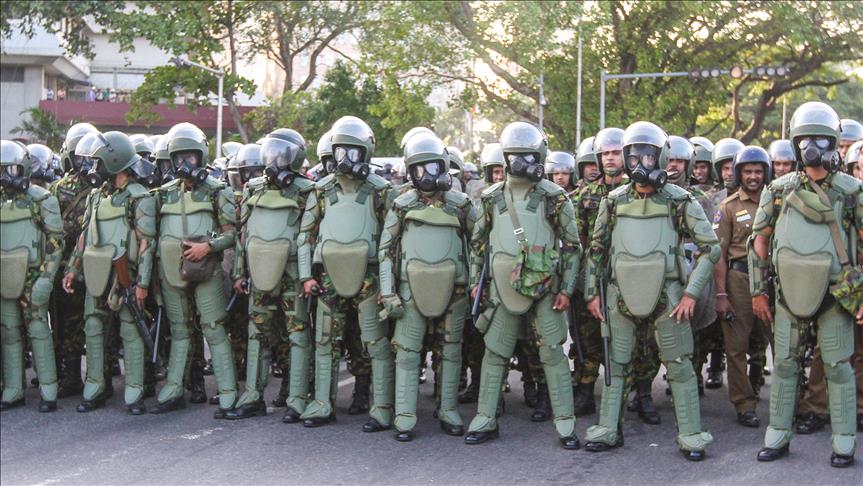Sri Lanka vows to introduce sweeping police reforms
Reform process ongoing as rights advocates say pledges to eradicate ‘deeply embedded’ use of torture not being fulfilled

By Dilrukshi Handunnetti
COLOMBO, Sri Lanka
Sri Lankan police have insisted that cases of police torture are limited despite rights advocates warning that authorities are not fulfilling pledges to eradicate the "deeply embedded" practice.
Deputy Inspector General Priyantha Jayakody told Anadolu Agency on Tuesday that the Sri Lanka Human Rights Commission’s claim of some 3,000 cases was an "exaggerated number".
Over the past three months, the police force has conducted orientations for personnel in adherence to a new government policy of "zero tolerance for torture".
However, a New York-based rights watchdog has accused Sri Lanka of failing to take serious measures to reduce torture in custody, despite key allegations against the island’s police force including its deeply-entrenched practice of using torture as a tool for procuring "confessions".
Human Rights Watch (HRW) said in a statement Monday that the country’s "draconian" Prevention of Terrorism Act (PTA) has not been repealed despite promises, while a pledge to curtail police abuses prior to a March 2017 session of the United Nations Human Rights Council (UNHRC) has not been fulfilled.
"Nearly 18 months after making important promises to the Council, Sri Lanka’s leaders appear to be backtracking on key human rights issues, including reforming the police," the group’s Asia director, Brad Adams, said in the statement.
"Reform of the security sector has lagged behind action on the Council resolution’s four pillars of transitional justice: accountability, the disappeared, truth-seeking and reconciliation."
Deputy Inspector General Jayakody insisted that hearsay cannot form data as he said many reports had done, adding that police are setting up their own database of cases reported in media with strict follow-ups.
According to a top official from the island’s Ministry of Law and Order -- which oversees the police department -- the government is working on a process to strengthen the police force though a new reform process.
The official, speaking on condition of anonymity as he was designated to speak to media, told Anadolu Agency that the rigorous process includes the introduction of a contemporary national security law aimed at modernizing the force and addressing some key concerns.
He highlighted that police personnel are also expected to undergo training on human rights.
Referring to serious allegations against the police, he said internal mechanisms have been strengthened to curtail police abuse.
"It is work in progress," he underlined, referring to the reform process.
Last month, UN Special Rapporteur on Torture Juan Mendez -- who visited Sri Lanka in May 2016 -- highlighted in a report to the UN the ongoing "culture of torture".
He referred to torture to produce confessions, including the use of beatings, sexual violence, extreme stress positions and asphyxiation at police stations, military facilities and detention centers across the island.
In June 2016, President Maithripala Sirisena instructed the police and military to refrain from torture but the Mendez report made special references to "white van abductions" having taken place since Sirisena assumed office in January 2015 on a good governance platform.
Well-known human rights activist Ruki Fernando told Anadolu Agency that "torture is routine, so is impunity" and such has remained the case under Sirisena.
"There are harrowing testimonies of torture, including sexual torture, by the police and also the military, recorded an even in 2016," said Fernando, who works with detainees.
"The PTA is a license for torture and it’s unacceptable that for 18 months the government has failed to fulfill its commitment to repeal it," he stressed.
"It is crucial for the UNHRC to hold the government accountable for ongoing violence and abuse and the lack of reforms."
Meanwhile, the executive director of the International Truth and Justice Project, Yasmin Sooka, has called for an office independent of the Attorney General’s office to investigate and prosecute allegations of torture.
The anti-terror law was used as a tool of control by successive governments during a protracted war against the separatist Liberation Tigers of Tamil Eelam (popularly known as the Tamil Tigers), which fought for a separate homeland in Sri Lanka’s north and east until their defeat in 2009.
Anadolu Agency website contains only a portion of the news stories offered to subscribers in the AA News Broadcasting System (HAS), and in summarized form. Please contact us for subscription options.






